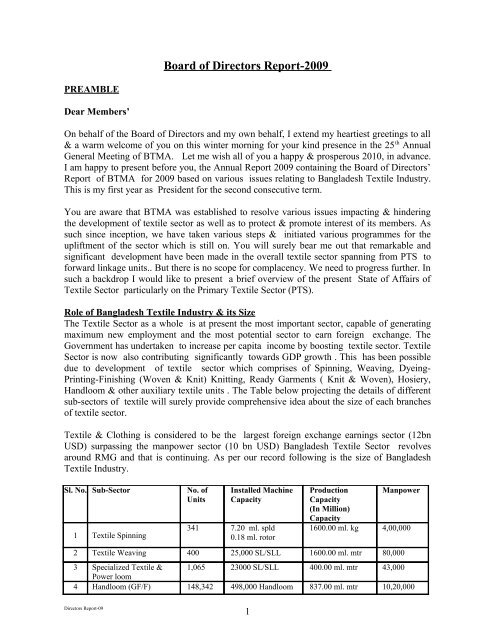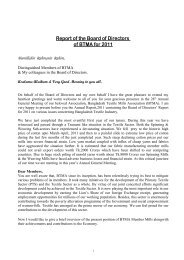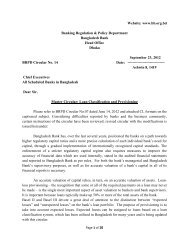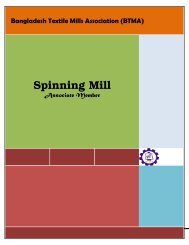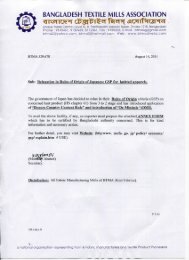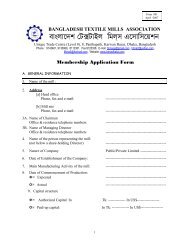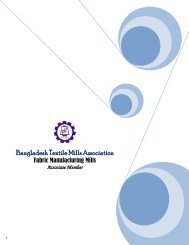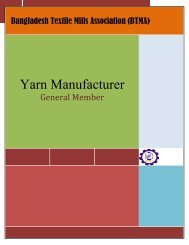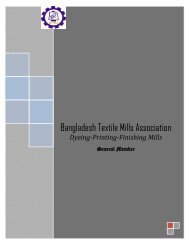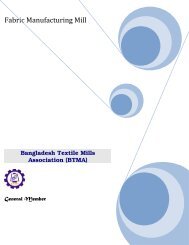You also want an ePaper? Increase the reach of your titles
YUMPU automatically turns print PDFs into web optimized ePapers that Google loves.
<strong>Board</strong> <strong>of</strong> <strong>Directors</strong> <strong>Report</strong>-<strong>2009</strong>PREAMBLEDear Members’On behalf <strong>of</strong> the <strong>Board</strong> <strong>of</strong> <strong>Directors</strong> and my own behalf, I extend my heartiest greetings to all& a warm welcome <strong>of</strong> you on this winter morning for your kind presence in the 25 th AnnualGeneral Meeting <strong>of</strong> <strong>BTMA</strong>. Let me wish all <strong>of</strong> you a happy & prosperous 2010, in advance.I am happy to present before you, the Annual <strong>Report</strong> <strong>2009</strong> containing the <strong>Board</strong> <strong>of</strong> <strong>Directors</strong>’<strong>Report</strong> <strong>of</strong> <strong>BTMA</strong> for <strong>2009</strong> based on various issues relating to Bangladesh Textile Industry.This is my first year as President for the second consecutive term.You are aware that <strong>BTMA</strong> was established to resolve various issues impacting & hinderingthe development <strong>of</strong> textile sector as well as to protect & promote interest <strong>of</strong> its members. Assuch since inception, we have taken various steps & initiated various programmes for theupliftment <strong>of</strong> the sector which is still on. You will surely bear me out that remarkable andsignificant development have been made in the overall textile sector spanning from PTS t<strong>of</strong>orward linkage units.. But there is no scope for complacency. We need to progress further. Insuch a backdrop I would like to present a brief overview <strong>of</strong> the present State <strong>of</strong> Affairs <strong>of</strong>Textile Sector particularly on the Primary Textile Sector (PTS).Role <strong>of</strong> Bangladesh Textile Industry & its SizeThe Textile Sector as a whole is at present the most important sector, capable <strong>of</strong> generatingmaximum new employment and the most potential sector to earn foreign exchange. TheGovernment has undertaken to increase per capita income by boosting textile sector. TextileSector is now also contributing significantly towards GDP growth . This has been possibledue to development <strong>of</strong> textile sector which comprises <strong>of</strong> Spinning, Weaving, Dyeing-Printing-Finishing (Woven & Knit) Knitting, Ready Garments ( Knit & Woven), Hosiery,Handloom & other auxiliary textile units . The Table below projecting the details <strong>of</strong> differentsub-sectors <strong>of</strong> textile will surely provide comprehensive idea about the size <strong>of</strong> each branches<strong>of</strong> textile sector.Textile & Clothing is considered to be the largest foreign exchange earnings sector (12bnUSD) surpassing the manpower sector (10 bn USD) Bangladesh Textile Sector revolvesaround RMG and that is continuing. As per our record following is the size <strong>of</strong> BangladeshTextile Industry.Sl. No. Sub-Sector1 Textile SpinningNo. <strong>of</strong>UnitsInstalled MachineCapacity341 7.20 ml. spld0.18 ml. rotorProduction ManpowerCapacity(In Million)Capacity1600.00 ml. kg 4,00,0002 Textile Weaving 400 25,000 SL/SLL 1600.00 ml. mtr 80,0003 Specialized Textile & 1,065 23000 SL/SLL 400.00 ml. mtr 43,000Power loom4 Handloom (GF/F) 148,342 498,000 Handloom 837.00 ml. mtr 10,20,000<strong>Directors</strong> <strong>Report</strong>-091
5 Knitting, Knit Dyeing(GF):(a) Export-Oriented(b) Local Market6 Dyeing & Finishing (FF):(a) Semi-mechanized8002,00018013012,000 Knit/Dy/M5,000 Knit/M 3,600.00 ml. mtr500.00 ml. mtr--120.00 ml. mtr1600.00 ml. mtr300,00024,00010,00023,000(b) Mechanized7 Export Oriented RMG 4,500 - 475.00 ml. doz 20,00,0008 Others: - - - 600,000GRAND TOTAL 45,00,000Contribution <strong>of</strong> TextilesThe textile industry is the largest manufacturing sub-sector <strong>of</strong> the country’s Industrial Sector.Textile Industry, until liberation was mainly a small industry to cater the local requirement.Subsequently after liberation it entered into export market <strong>of</strong> ready made garments initially inthe early eighties and by now has achieved a spectacular growth pattern during the last threedecades. Now, the sector in addition to meeting the almost cent percent demand <strong>of</strong> fabric &apparels domestically, contributes significantly in the export trade <strong>of</strong> textile & clothing. HereI give an over view <strong>of</strong> the achievement and contribution <strong>of</strong> the textile sector.• Export earnings from textile increased tremendously, which is now over 12 bn billionUSD i.e. 79 % <strong>of</strong> the total export earnings <strong>of</strong> the country.• Around 100% <strong>of</strong> domestic yarn & fabric requirements are met by PTS, where 85-90%yarn requirements for export <strong>of</strong> knitwear & 35-40% yarn requirement woven RMGare meet by PTS.• 78% <strong>of</strong> the total export earnings and 40% value addition <strong>of</strong> manufacturing sector comefrom textile.• Provides around 5 million jobs <strong>of</strong> which 80% are women.• Contributes around 10% to GDP• Retains 68-70% foreign currency through knitwear exports• Creates huge cliental base for Banking, Insurance, Transportation, Hotel, Tourism,Toiletries & many others.• PTS is considered an import substitute industry.INTERNAL ISSUESBUDGETAt present the use <strong>of</strong> fabrics made <strong>of</strong> man-made fibre has increased significantly the due tocomfort <strong>of</strong> the fabrics & easy to wear. Currently the ratio <strong>of</strong> demand for blended RMG isabout 30%. Considering the huge potential <strong>of</strong> theRMG made <strong>of</strong> blended yarn particularlyfrom Viscose, Polyester & Acrylic Staple fibre, we raised the negative impact <strong>of</strong> such dutyimposition to NBR as well as Finance Ministry and requested to allow duty free import <strong>of</strong> theabove raw materials in line with raw cotton.Since the inception <strong>of</strong> <strong>BTMA</strong>, we are relentlessly trying to create a favourable environmentfor our industry to operate at par with the competing countries. Considering the above, wesubmitted the following proposals to the National <strong>Board</strong> <strong>of</strong> Revenue before the pre-budgetdiscussion meeting :<strong>Directors</strong> <strong>Report</strong>-092
In order to encourage re-investment, extend the validity <strong>of</strong> SRO No. 168/Law/Incometax/2000 till 2015. Review the definition <strong>of</strong> Textiles with inclusion Spinning, Weaving, Knit Dyeing, YarnDyeing and Dyeing-Printing-Finishing as Textiles. Extend facilities to deemed exporters similar to those <strong>of</strong> existing f 100% export orientedunits. Withdrawal <strong>of</strong> import duty & VAT on Polyester, Viscose, Acrylic, Moda-Acrylic Staplefibre, Chips & Pet-chips. Withdrawal <strong>of</strong> import duty on Capital Machinery <strong>of</strong> textiles both for local & exportoriented industry. Complete withdrawal <strong>of</strong> all kinds <strong>of</strong> duty on import <strong>of</strong> spare-parts, dyes-chemicals andsizing materials used in textile sector. Extend Tax Holiday to all sub-sectors <strong>of</strong> textile upto 2015. Allow duty free import <strong>of</strong> chemicals used in ETP..Some <strong>of</strong> the above proposals <strong>of</strong> <strong>BTMA</strong> were reflected in the National Budget for <strong>2009</strong>-10.However, efforts are continuing to convince the Government to consider the other proposals<strong>of</strong> <strong>BTMA</strong> which have been left out for the greater interest <strong>of</strong> the textile sector as a whole.Banking MattersA delegation headed by <strong>BTMA</strong> President met the Governor, Bangladesh Bank anddiscussed various banking and financial issues relating to exports, incentive, interest rate, cost<strong>of</strong> capital and other related issues. You will be glad to know that disputes between bankers &millers for not following the prescribed rules & regulation particularly on L/Cacceptance and delay in payment by some <strong>of</strong> the commercial banks on various excuseswas also raised during the meeting. Two Deputy Governors were present during thediscussion and advised <strong>BTMA</strong> to submit specific proposals on problems arising out <strong>of</strong> nonacceptance <strong>of</strong> the L/C documents. Accordingly, the issue was placed in the <strong>Board</strong> <strong>of</strong> Directormeeting wherein a sub-committee was formed to make specific proposal on the above issue. Iam grateful to the members <strong>of</strong> the Sub-Committee for making the following proposal which<strong>BTMA</strong> forwarded to the Bangladesh Bank with request to insert in the L/C as a provisionalclause.* Delivery Challan shall be signed by Applicant or his authorized persons whosename be mentioned in the L/C.* A vendor agreement is to be signed between buyers & sellers so that in future ifany claim arises with regard to short-supply <strong>of</strong> the goods quality <strong>of</strong> the goods ordelay in supply shall be settled under the terms & conditions <strong>of</strong> the vendorsagreement to the entire satisfaction <strong>of</strong> both the party, if necessary.I am confident that if the above proposal is considered, it will help the exporters in operatingtheir business smoothly without any consequential loss. <strong>BTMA</strong> is perusing Bangladesh Bankto insert the above clause in the L/C. In addition to above, the following proposals were alsosubmitted by <strong>BTMA</strong> during the meeting with Governor, Bangladesh Bank. :- Provision <strong>of</strong> import facility with the foreign exchange earned out <strong>of</strong> exports.- Include deemed exporting units into the fold <strong>of</strong> Export Development Fund (EDF)(Bangladesh Bank has accepted the proposal and 75% <strong>of</strong> the raw material <strong>of</strong> PTScould be imported. out <strong>of</strong> EDF)- Fixation <strong>of</strong> interest rate at single digit.<strong>Directors</strong> <strong>Report</strong>-093
- Withdrawal <strong>of</strong> discriminating interest rates inclusive <strong>of</strong> equity, bank commission& charges- Enhancement <strong>of</strong> funding limit <strong>of</strong> ETP Fund.- Rationalization <strong>of</strong> CIB reports<strong>BTMA</strong> even though a national trade body, still its multinational role has established theassociation into the global Textile Trade arena. Therefore, <strong>BTMA</strong> sometime plays veryeffective role in shaping international policies pertaining for T & C. Due to positive roleplayed by <strong>BTMA</strong> in influencing global textile trade, some international organizationsextended invitation to <strong>BTMA</strong> President and members for participation in various eventsespecially seminars, workforce to present key note papers particularly related to national andinternational T & C trade.HUMAN RESOURCE DEVELOPMENT ISSUETextile is the backbone <strong>of</strong> Bangladesh Economy. Over the years textile proved to be theengine <strong>of</strong> growth as it has been the 2 nd largest sector for absorption <strong>of</strong> working force afteragriculture. On the other hand textile sector in Bangladesh is the largest single sector havinghighest investment around 3.5 billion Euro. Over the last 3 decades this sector has achievedun-precedented growth. As such we feel it is our obligation to take all possible initiative/stepsto protect the sector and make the sector more competitive as well.Though huge investment have been made and latest state-<strong>of</strong> the art technology are being usedin the textile industry still we are lacking behind to provide adequate knowledgeable skilledwork force. You will agree that in Bangladesh Research & Training for skill development,enhancement <strong>of</strong> efficiency & productivity <strong>of</strong> workforce in textile sector are not upto asatisfactorily level compared to our competitor. We thought that without over alldevelopment including improvement <strong>of</strong> technology, increase in the number skilled manpower,our textile industry will face serious handicap in the global textile trade.Accordingly upon a proposal <strong>of</strong> <strong>BTMA</strong>, the Government transferred National Institute <strong>of</strong>Textile Training, Research & Design (NITTRAD) (former TIDC renamed by BTMC) to<strong>BTMA</strong> to run the institute under public-private partnership. Now NITTRAD is operatingunder a newly reconstituted Governing Body headed by <strong>BTMA</strong> President as its convener.Meantime the Governing Body has taken various steps to make the NITTRAD a Centre <strong>of</strong>Excellency. Some notable programmes <strong>of</strong> NITTRAD are appended below :Name <strong>of</strong> the CourseYarn Manufacturing Development and Operation <strong>of</strong>Computerized Spinning plant Integrated Productivity ImprovementApproach in SpinningFabric Manufacturing How to Ensure Quality <strong>of</strong> Yarn Production <strong>of</strong> Fashion Fabrics inCircular Knitting Machine Selection <strong>of</strong> Process Parameters in<strong>Directors</strong> <strong>Report</strong>-094Garments Technology Costing <strong>of</strong> Apparels and effectiveapproaches to cost minimizationTextile Testing and Quality Control Testing <strong>of</strong> Cotton Fibre Using HVI andAFIS Assessment <strong>of</strong> Yarn Faults by UsterClassimate Tester Quality Characteristics <strong>of</strong> Yarn and theirImpact on Woven Fabric Quality
Circular Knitting to Achieve aPredetermined Finished GSM fabricDyeing & Finishing Working with Continuous Pretreatment,Dyeing and Finishing Efficient Knit Dyeing with Reactive &Disperse Dyes Effluent Treatment & Waste Disposal inDyeing/Finishing MillsOthers Foundation Training in TextileEngineering Foundation Training in TextileManagement Application <strong>of</strong> Computer in TextilesI believe that the above training programme will be beneficial for our members. So I requestall the distinguished members to nominate their <strong>of</strong>ficers/staff to participate in the trainingprogramme. I am pleased to inform you that the Governing Body is actively consideringstarting BSC Textile Engineering (graduate course) course. I am confident this will help toreduce our dependency on foreign experts and will save huge foreign currency as well.Inspite <strong>of</strong> one <strong>of</strong> the most liberal investment policies we have failed to attract a significantquantum <strong>of</strong> FDI as well as domestic investment.As the apex body <strong>of</strong> the primary textile sector we consider all-out efforts should be taken toattract investment both local and foreign and to assists our potential entrepreneurs to invest inthe textile sector. Realizing the role <strong>of</strong> <strong>BTMA</strong> since 2004 we are organizing an exhibitionnamely the Dhaka International Textile and Garments Machinery Exhibition in co-operationwith a foreign organization. I think this has helped our entrepreneurs, local textile andgarment manufacturers and the technician unique opportunity to have glimpse <strong>of</strong>technological advancement that have been made in the global textile production. This year,the said exhibition will be held in February 2010. The main objective <strong>of</strong> holding the aboveexhibition is to familiarize the local entrepreneurs with the state <strong>of</strong> art technology used intextile industry. DTG <strong>of</strong>fers the concerned stake-holders the following opportunities .• Showcase the latest machinery, equipment, accessories and development that hastaken place in the industry for marketing and expanding business.• Transfer <strong>of</strong> high technology and identifying field for investment and jointventures in Bangladesh• Sourcing output requirements from Bangladesh• Technology adaptation and up gradation• Supply <strong>of</strong> plant, machinery, process control equipment, projects and services etc.• Project collaborations• One to One business meetings and net working opportunities• Opportunity to have a glimpse <strong>of</strong> latest technologies without going abroad.This year more than 300 exhibitors from 23 countries participated with 700 booths. The eventwas highly successful. This has now become a regular event <strong>of</strong> <strong>BTMA</strong>. I am pleased toannounce here that the 7 th Dhaka International Textile and Garments Machinery Exhibition(DTG) will be held in February, 2010 from February 2-5. I invite all <strong>of</strong> my distinguishedfriends, colleagues and entrepreneurs to visit the upcoming exhibition.<strong>Directors</strong> <strong>Report</strong>-095
POWER & ENERGY SITUATIONYou will agree that, we are, (the entrepreneurs who are running their factory through captivegeneration) facing serious problem to operate our units due to acute short supply <strong>of</strong> gas aswell as low gas pressure. As per our record mills located at Gazipur, Kaliakoir, Tongi &Tangail are being seriously affected due to power crisis caused by low gas pressure. Theaccumulated impact <strong>of</strong> irregular supply <strong>of</strong> gas & low pressure <strong>of</strong> gas have forced down themills <strong>of</strong> the above areas to cut down their production capacity below 48% resulting hugefinancial loss, which is continuing unabated. Availability <strong>of</strong> gas has now become erratic andthis is now putting the industry into jeopardy as many <strong>of</strong> them are unable to achieve thetargeted production level due to inappropriate gas supply. As such they are failing to meetthe export deadline which is apart from loss <strong>of</strong> revenue entailing the units to penalties &finally loss <strong>of</strong> export market.When such a situation was prevailing in the gas transmission Bangladesh Energy RegulatoryCommission arranged a Public Hearing <strong>of</strong> the stake-holders for soliciting views regardingadjustment or revision <strong>of</strong> gas price. Last 3/4 months global trading scenario has taken into apositive turn and the world economy has gradually been coming out <strong>of</strong> recession. Major itemsincluding petroleum price plummeted by 50-60% per barrel. As such we felt that the majorfactor that prompted for the revision/adjustment <strong>of</strong> gas price i.e higher cost <strong>of</strong> production dueto direct influence <strong>of</strong> higher petroleum price, does not justify to be a never be a valid reasonfor enhancing <strong>of</strong> gas price. Considering the above we requested the Government not to go forthe gas price escalation. On the other hand we also requested the Government to take thefollowing points into consideration before taking any decision with regard toescalation/adjustment/revision <strong>of</strong> gas price if situation demands in future :• Bangladesh Government has failed to provide required power to industrial units,though this is the responsibility <strong>of</strong> the Govt. but the units are generating powernot out <strong>of</strong> choice but out <strong>of</strong> compulsion• The industries in Bangladesh, especially the Textiles & Clothing are competingwith giant competitors operating in international markets where energy andother utilities are guaranteed by the Government or local authorities• Big industrial units under private sector had to make huge investment forcaptive power generation including infrastructure development.• Gas connection and to ensure proper flow <strong>of</strong> gas, industrial units had to incuradditional expenditure resulting in increasing project cost thereby, affecting cost<strong>of</strong> production.You are aware that the Government has given exemption from duty /VAT on import <strong>of</strong> sometextile spare-parts and allowed import <strong>of</strong> dyes-chemicals and sizing materials withconcessionary rate <strong>of</strong> duty subject to Certification from <strong>BTMA</strong>. This surely has given ussome sorts <strong>of</strong> relief . You will positively bear me out that owing to supportive policies <strong>of</strong> theGovernment mainly withdrawal <strong>of</strong> duty from textile capital machinery, some raw materialsand introduction <strong>of</strong> incentive, our spinning & knitting sub-sector has achieved a phenomenalgrowth.However I am sorry to mention here that the Caretaker Government, in 2007 imposed duty ontextile capital machinery and on some raw materials <strong>of</strong> textiles mainly Viscose, Polyester &<strong>Directors</strong> <strong>Report</strong>-096
Acrylic Staple fibre, Chips & Pet-chips, which is still in force. You are aware that to sustainin the competitive market environment and to face global challenge on an equal footing, agood number <strong>of</strong> spinning mills converted part <strong>of</strong> their production facilities to produce blendedyarn with mixture <strong>of</strong> raw cotton & man made fibre.ACTIVITIES IN THE INTERNATIONAL ARENAPresident, <strong>BTMA</strong> had the opportunity to undertake a number <strong>of</strong> foreign trips to projectBangladesh Textile sector in various international fora .- Office <strong>of</strong> Commercial Affairs <strong>of</strong> Royal Thai Embassy in Dhaka organized an exclusive9 members Textile Trade Mission to Thailand and to exchange views with Thaientrepreneurs and visitors. During the visit the members <strong>of</strong> the delegation participatedin various programmes arranged by the Thai Government. I consider such visit always afruitful and result oriented one.- Ministry <strong>of</strong> Commerce, Government <strong>of</strong> the People’s Republic <strong>of</strong> China in cooperationwith the China Chamber <strong>of</strong> Commerce for Import and Export <strong>of</strong> Textilesorganized the International Forum for developed <strong>of</strong> Textile and Apparel Trade. Theaim <strong>of</strong> the forum was to bring together major importers and suppliers <strong>of</strong> the textilemachinery and Government <strong>of</strong>ficials from trading countries to share their views on thetrends <strong>of</strong> the Global Textile and Apparel Trade and to look for new avenues to ventureinto & encash opportunities facing the industry amidst the current financial crisis andin the past crisis era. I attended the said forum wherein I presented a paper containingthe proposal, problems and the challenges <strong>of</strong> Bangladesh Textile Industries.-<strong>BTMA</strong> President has been an Associate Director <strong>of</strong> ICA which is a rare honour fororganization to uphold the image <strong>of</strong> the Association.- I attended the Annual Dinner <strong>of</strong> International Cotton Association (ICA) wherein Isubmitted proposals for simplification and rationalization <strong>of</strong> some clauses <strong>of</strong> ICA Lawsand bye-laws. I am pleased to mention here that the ICA authority has taken thoserecommendations in positive note and assured me that they would take appropriateinitiative to mitigate the difficulties, if any arising out <strong>of</strong> complicacy at ICA laws andbye-laws. You will be happy to know that ICA is actively considering to organize aworkshop in Dhaka on the observation <strong>of</strong> <strong>BTMA</strong> & would like to solicit reactions <strong>of</strong>stake-holders on the recommended laws and bye-laws <strong>of</strong> ICA.THE 7 TH WTO MINISTERIAL CONFERENCEThe 7 th Ministerial Conference held in Geneva between 30 th November, <strong>2009</strong> and 2 ndDecember, <strong>2009</strong>, Hon’ble Commerce Minister led a 17-member Bangladesh delegation.President <strong>BTMA</strong> was a member <strong>of</strong> the Bangladesh delegation. The Ministerial was held in thebackdrop <strong>of</strong> slow process <strong>of</strong> Doha Round <strong>of</strong> Negotiations and Global Financial crisis. TheMinisterial was held mainly to meet obligatory requirement rather than a negotiating meeting.However, in the Plenary session “WTO Multilateral Trading System and Current GlobalEconomic Environment” was discussed, while in the working sessions Doha WorkProgramme and WTO’s contribution to recovery, growth & development have beendiscussed. Issues like NAMA, DFQF market access, RoO, Services, Agriculture, Tradefacilitation, TRIPS, Trade & Environment, Rules and S&D were discussed without any<strong>Directors</strong> <strong>Report</strong>-097
specific recommendations. No one knows when DDA would be implemented if at all. On theother hand commitments made in Hong Kong Ministerial to all LDCs 97% products as dutyfreeare yet to be implemented.REGIONAL ACTIVITIES- SAARC Chamber <strong>of</strong> Commerce and Industry organized the 3 rd SBLC regional cooperation.A catalyst for socio-economic growth in South Asia was held in Sri-Lankabetween SBLC is a prestigious event <strong>of</strong> SAARC CCI. Head <strong>of</strong> the government <strong>of</strong> theSocialist Republic <strong>of</strong> Sri-Lanka, leading politician, prominent speakers, scholars andelite corporate leaders from SAARC region addressed on trade, investment, socialsecurity, HRM, Environment protection etc.. The third SBLC focused mainly on thefollowing issues :- Global financial crisis and its impact on South Asia- Addressing food crisis through enhanced investment in agriculture.- Interactive dialogue between business leaders and triumphant entrepreneurs.- Trade facilitation : A fosterer <strong>of</strong> regional integration.- Trade in services: Prospects and challenges for regional integration- Climate change & depleting water resources: emerging priority concerns for SouthAsia.- Culture and Tourism : A fosterer <strong>of</strong> socio-cultural interactions.- Creating synergies in the area <strong>of</strong> enhanced regional cooperation.Besides the above I participated various seminar, workshops organized by theinternational organization based in Dhaka and also attended various based in Dhakaand also attended various meetings <strong>of</strong> the Ministries which were related to the interest <strong>of</strong>textile industry.INTERNATIONAL POLICES RELATED TO TRADE PROMOTIONEU GSPYou are aware that 27 Member States <strong>of</strong> the European Union (EU) are one <strong>of</strong> the mostimportant destinations <strong>of</strong> Bangladesh’s Textile & Clothing Export. European Union (EU) asa single market entity market is the destination <strong>of</strong> over fifty percent <strong>of</strong> our total export.One very vital factor contributing to this achievement has been Generalized System <strong>of</strong>Preference (GSP) granted by the European Commission (EC) under its Everything ButArms (EBA) Scheme. The GSP Scheme was introduced in 1971 to support Trade Aid. thescheme was governed by the concept <strong>of</strong> Rules <strong>of</strong> Origin (RoO), to determine the country <strong>of</strong>origin <strong>of</strong> the product.Rules <strong>of</strong> Origin (RoO) is a set <strong>of</strong> criteria imposed that needs to be complied with for the GSPeligibility <strong>of</strong> products exported from the beneficiary country. RMG & Textile products fromBangladesh enjoy GSP facilities since we entered into export market. Since the introduction<strong>of</strong> the scheme a three-stage transformation criteria (from fibre to yarn, from yarn to fabric &from fabric to apparels) was required to be complied with to be eligible to receive GSPfacility; i.e. duty free market access for T & C In 1998 EC derogated the RoO for the leastdeveloped countries (LDC). Since then, only two-stage transformation is required to be GSPeligible.<strong>Directors</strong> <strong>Report</strong>-098
in jeopardy leading to closure <strong>of</strong> mills, increase redundancy in employment & affectingpoverty alleviation programme.NPDANew Partnership for Development Act <strong>of</strong> 2007 designed to provide duty free quota freemarket access to the U.S, was introduced by Senators McDermott and English in the House <strong>of</strong>Representatives. The bill has two components (i) duty free market access for LDC’s productsoriginating in all LDC’s.(ii) aid and development funds for the LDC’s.The bill however, does not make the beneficiary countries automatically eligible. The bill hasprovided power to U.S President not to designate a country as a beneficiary <strong>of</strong> the preferentialtreatment. A number <strong>of</strong> conditions both with regard to eligibility as a beneficiary andsubsequent continuation as a beneficiary country must be complied with. They are: (a)Adoption and maintenance in statues & regulation <strong>of</strong> core labour standards & theirenforcement, (b) meaningful progress towards establishing market-based economy withminimum govt. interference in economic activities, (c) elimination <strong>of</strong> barriers to U.S trade andinvestment, (d) protection to intellectual property, (e) resolution <strong>of</strong> bilateral trade &investment disputes, (f) introduction <strong>of</strong> a system to combat corruption, (g) enforcement <strong>of</strong>laws to manage natural resources and prevent exports <strong>of</strong> illegally harvested flora and fauna.(h) cooperation in international efforts to eliminate human rights violation and (i) access tothe U.S authority to investigate and monitor compliance regarding enforcement <strong>of</strong> labourrights.At the initial stage the bill generated high hopes among the Textile and Clothing sub-sectorexporters, but with detailed analysis and evaluation by the 11 member Expert Committerformed by Ministry <strong>of</strong> Commerce, where Secretary General <strong>of</strong> <strong>BTMA</strong> was a member, it wasconcluded that it would be difficult to comply with all core conditions to be eligible as abeneficiary country even if the bill is passed and turned into an Act. However, negotiation ison to relax the stringent conditionalities. This is for information <strong>of</strong> the members <strong>of</strong> <strong>BTMA</strong>.DAC Issue :( Disproportionately Affected Countries)Pakistan & Sri-Lanka are considered to be the disproportionately affected countries (DAC)are <strong>of</strong>fered tariff reduction for 5 products each with ( 5 years instead <strong>of</strong> 10 years), which willput Bangladesh in disadvantage position these lines <strong>of</strong> products represent more that 50% <strong>of</strong>Bangladesh’s Export to USA.Global Economic SituationYou are aware that the mills under Primary Textile Sector especially the spinning mill had topass through a very torrid time between January to June this year to market their yarn. Due t<strong>of</strong>all in demand & high cost <strong>of</strong> produce the spinning mills lost their competitiveness which hasbeen compounded by devaluation <strong>of</strong> currency <strong>of</strong> our neighbouring countries. The extrafinancial benefits under the banner <strong>of</strong> stimulus packages they could sell their yarn at a lowerprice compared to our produced. <strong>BTMA</strong> member mills yarn has been at much higher pricedue higher cost <strong>of</strong> production on account <strong>of</strong> higher procurement cost <strong>of</strong> raw cotton. You werealso aware that at that time unsold yarn valued at thousands <strong>of</strong> crores <strong>of</strong> Taka had stock piledup at various mills. Even in such a situation to protect the jobs <strong>of</strong> millions <strong>of</strong> workers and tokeep the mills running, we were forced to sell our produce at much lower price ( on anaverage 40 to 45 cent loss) than cost <strong>of</strong> production must to stay in business. This compelledthe nulls to suffer continuous loss leading to serious liquidity crisis, reducing the economicviability <strong>of</strong> the mills. As a result most <strong>of</strong> the member mills failed to repay their loan<strong>Directors</strong> <strong>Report</strong>-0910
instalment We are grateful to the Govt. for realisation <strong>of</strong> the problem and thereforesubsequent directives to extend time for re-scheduling <strong>of</strong> the Term Loan re-payment.Considering the gravity <strong>of</strong> the situation <strong>BTMA</strong> initiated a lot <strong>of</strong> efforts to apprise theconcerned authorities <strong>of</strong> the Government regarding the negative impact <strong>of</strong> global economicrecession on the PTS. We met the Hon’ble Minister for Textile & Jute, Minister forCommerce & Minister for Finance. Finally, we met the Hon’ble Prime Minister. During thesemeetings we submitted memorandum outlining our position alongwith recommendations toover come the crisis. Finally, realising the impact <strong>of</strong> recession, the Government formed aTask Force to access and monitor the impact <strong>of</strong> recession and suggest ways & means toovercome the crisis including probable stimulus packages.Subsequently, the Taskforce in its 2 nd meeting formed a 7-members sub-committee wherein<strong>BTMA</strong> President is a member to evaluate <strong>of</strong> global Economic Recession & its impact on allexport sectors including T & C.. Soon after the formation <strong>of</strong> the sub-committee <strong>BTMA</strong>submitted a comprehensive paper containing the following recommendation for considerationto over come the crisis arising out <strong>of</strong> global economic recession. :- Enhancement <strong>of</strong> Alternative Cash Assistance from 5% to 15%- Placement <strong>of</strong> a one time fund for spinning mills as an interim step as promisedby the Finance Minister- Create a Fund for interest subvention @ 5% as a long term measure .It will be pertinent to inform the Hon’ble members <strong>of</strong> <strong>BTMA</strong> that the Government on25-11-09 has for the 1 st time announced a stimulus package covering Textile and Clothing. tomitigate the negative impact <strong>of</strong> Global recession. The package is to the tune <strong>of</strong> Taka 1000/-crores which covered various noted issues including use <strong>of</strong> EDF for import <strong>of</strong> raw-cotton.Access to EDF shall be a major step forward for fighting the negative consequences <strong>of</strong> globalfinancial crisis to some extent to the member-mills.-The Government will pay the license/renewal fees <strong>of</strong> Captive Power plants used inindustrial units from November 01, <strong>2009</strong> to June 2010 to compensate the losses due topower disruption/ poor gas supply.-Extension <strong>of</strong> the bank loan re-scheduling facilities without any down-payment up toJune 30, 2010 from October <strong>2009</strong> at 10% interest rate instead <strong>of</strong> 13% interest will beconsidered.-If any borrower defaults loan repayment during the above time frame, extension <strong>of</strong>the re-scheduling facility will be considered.-Members <strong>of</strong> Bangladesh Textile Mills Association (<strong>BTMA</strong>) will received 5% CashIncentive for direct export <strong>of</strong> yarn.-Government will introduce a uniform bank charges.-<strong>BTMA</strong> members that import cotton and other fibres for production <strong>of</strong> yarn will getaccess to Export Development Fund (EDF).-Government will bear 50 per cent cost <strong>of</strong> the operation <strong>of</strong> the National Institute <strong>of</strong>Textile Training, Research & Design (NITTRAD) from 2010 for the next three years. .<strong>Directors</strong> <strong>Report</strong>-0911
<strong>BTMA</strong>’S Initiatives for Policy Suggestions for Development <strong>of</strong> T & CTo make the textile industry more competitive countries. Following were the main proposal<strong>of</strong> <strong>BTMA</strong> have been submitted to the Policy maker.• Debt-equity ratio should be fixed at 70:30 on any favourable rate.• Weaving & Dyeing-Finishing sub-sector should be given extra thrust and prioritywhile considering bank loan for investment.• The difference between export proceed conversion with taka be restricted withinthe maximum range <strong>of</strong> 50 paisa between Taka and US dollar.• Interest on investment in the textile sector be fixed to 9% both by nationalizedand private sector banks. At the moment nationalized banks are lending loan at9% but private sector banks do not extend loan at that rate rather they charge @14%.• Considering textile as ‘Thrust Sector’ all importable spares used in the textilesector be made duty & tax free.• Considering textile as ‘Thrust Sector’ all importable dyes-chemicals and sizingmaterials used in the textile sector be made duty & tax free.• The rate <strong>of</strong> Cash Assistance in lieu <strong>of</strong> duty drawback & bond facilities beincreased to 15%.• Set up High-tech Park, Garment Villages, API & EPZ with necessaryinfrastructural facilities for setting up textile industries on priority basis.• The scheme <strong>of</strong> Tax-Holiday to continue upto 2015.• Protect the environment by establishment <strong>of</strong> Central Effluent Treatment Plant(ETP). At the same time private sector be encouraged by providing machines,equipments and spare-parts duty free and to make provision for bank loan atlower rate <strong>of</strong> interest for setting up ETP at individual level.• Considering textile to be a Thrust Sector the Electricity, Gas, C&F & Insurancebe left out <strong>of</strong> VAT net.LAND FOR <strong>BTMA</strong> BHABANOver the years <strong>BTMA</strong>’s area <strong>of</strong> operation has diversified to a great extent and itscontributions in the national economy is highly recognized by the policy makers. In the meantime huge investment has been made in the primary textile sector. resulting in expansion <strong>of</strong><strong>BTMA</strong>’s activities. All the leading Trade Associations/Chambers have its own building(Bhaban). Keeping that in mind and to perform its role more properly. I have deposited a sum<strong>of</strong> Tk. 6 Lac to RAJUK for a suitable land in Dhaka city, as per advertisement <strong>of</strong> RAJUK.Concluding Remarks:Dear Members,The importance <strong>of</strong> the textile sector in the national economy, its contribution to GDP, itsprovision to employment generation and contribution to the expansion <strong>of</strong> the industrial basecannot be ignored by anybody. Owing to <strong>BTMA</strong>’s relentless endeavour, the image <strong>of</strong> textilesector <strong>of</strong> Bangladesh has been enhanced nationally and internationally. <strong>BTMA</strong> is trying itsbest over the years to solve the problems confronting the textile sector. No doubt, significantdevelopment has already been achieved by now. However, there are a lot more to be done andthose need to be taken care <strong>of</strong>.<strong>Directors</strong> <strong>Report</strong>-0912
On different occasions, we took up the unresolved issues with the concerned authorities andtry to reach an amicable solution. I along with my fellow <strong>Board</strong> <strong>of</strong> <strong>Directors</strong> have always beentrying to work jointly for furtherance <strong>of</strong> our cause. Various issues affecting the growth <strong>of</strong>textile sector are there. If we get your continued support and co-operation, like that we havehad in the past, Insha-Allah, we will be victorious. In fine, I express my pr<strong>of</strong>oundappreciation to all <strong>of</strong> my distinguished members for their continuous and unconditionalsupport and co-operation.I have tried to lay before you the overall activities as well as programme undertaken by mycabinet. You will surely bear me out that when I took-over the realm <strong>of</strong> <strong>BTMA</strong>, the countrywas reeling under political upheavals. All machinery <strong>of</strong> the govt. were either inoperative orcould not function appropriately. In such an environment, we had to continue with ourassigned responsibilities. If some one is to work in a hostile and unfriendly environment,successful conclusion <strong>of</strong> programmes might not always be possible. However, we left nostone unturned to protect and uphold the interest <strong>of</strong> <strong>BTMA</strong> member mills including that <strong>of</strong>Textile sector as a whole. Whether we were successful or not in our endeavour will beassessed and judged by the beneficiary. I leave it with you to decide. We sincerely andhonestly tried our best to make various policies and programmes a success. No one canguarantee success in every venture. Success in trade related programme can not beguaranteed as many factors outside the control and power <strong>of</strong> individuals might impingeresulting in failure. In this regard sincerity <strong>of</strong> purpose and honest attempt could be viewedwith a positive frame <strong>of</strong> mind and perception. Before I conclude let me outline briefly whatwe have achieved and what remain to be done, although there is no finish line <strong>of</strong> success andimprovement. :Abdul Hai SarkerPresidentAllah Hafez !<strong>Directors</strong> <strong>Report</strong>-0913


